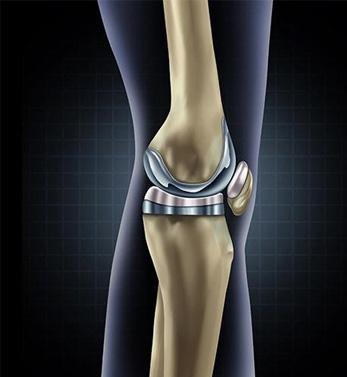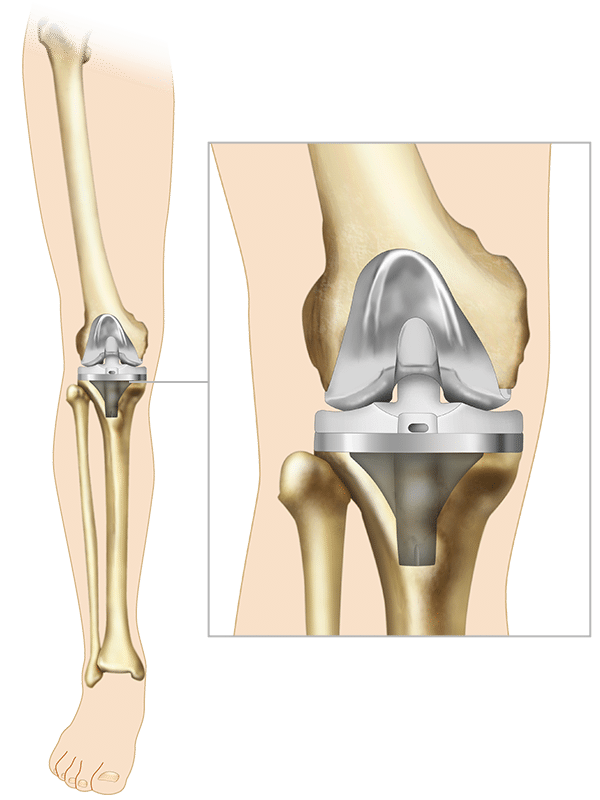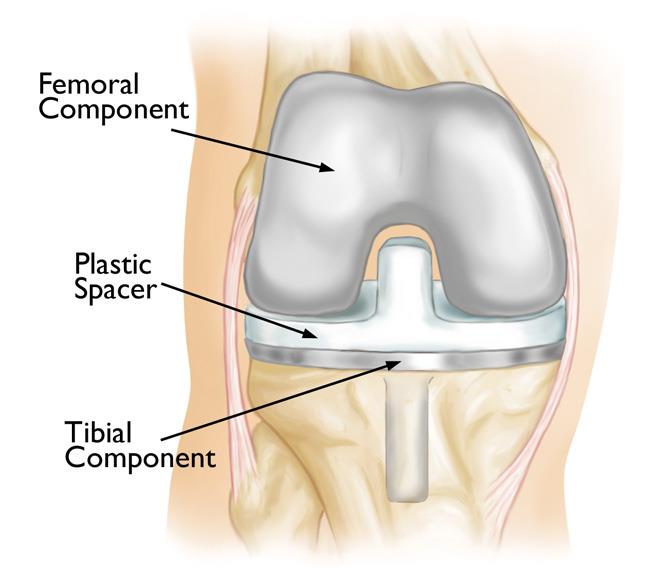





Knee prostheses; They are prostheses used in the treatment of severely damaged knee joint that causes pain, loss of function and inflammation. In knee replacement surgeries where the knee joint is replaced with an artificial joint called a prosthesis, damaged bone and cartilage tissues are cleaned and special structures containing metal alloys are used instead. In general, knee prostheses are frequently used in the problem of knee calcification in which the knee joint is severely damaged.
 By determining the worn surfaces of the cartilage and bone, placing prosthetic surfaces on these areas and completing the joint ensures that the knee joint is significantly relieved of problems due to calcification (osteoarthritis). The main parts of artificial prostheses that fulfill the function of the knee joint are made of titanium or a chromium-cobalt alloy. Spacers are produced from a material called polyethylene, which is a reinforced plastic. With the developments in prosthetic technologies in recent years, the materials used and production methods have also improved, and thus, much more functional knee prostheses have begun to be produced compared to the past. These developments have also led to a significant increase in the success of treatment and mobility in patients undergoing knee replacement surgery today. Knee replacement surgery is an operation that is generally preferred as a last option in the treatment of diseases affecting the knee joint.
By determining the worn surfaces of the cartilage and bone, placing prosthetic surfaces on these areas and completing the joint ensures that the knee joint is significantly relieved of problems due to calcification (osteoarthritis). The main parts of artificial prostheses that fulfill the function of the knee joint are made of titanium or a chromium-cobalt alloy. Spacers are produced from a material called polyethylene, which is a reinforced plastic. With the developments in prosthetic technologies in recent years, the materials used and production methods have also improved, and thus, much more functional knee prostheses have begun to be produced compared to the past. These developments have also led to a significant increase in the success of treatment and mobility in patients undergoing knee replacement surgery today. Knee replacement surgery is an operation that is generally preferred as a last option in the treatment of diseases affecting the knee joint.
This surgery can be applied if other treatment methods do not cause sufficient improvement in the patient's quality of life, and if conditions such as high level of pain and loss of function cannot be reduced by other applications. Some of the situations that may answer the question of who can undergo knee replacement surgery are as follows:
Pain and deformities of the knee joint
Serious damage to the cartilage of the knee joint on radiological images
Significantly reduced range of motion, difficulty even with simple daily functions such as walking or climbing stairs
Failure to improve with other applications such as drug therapy, rest and physical therapy
There is no age limit for knee prosthesis surgeries, which are generally applied to individuals between the ages of 50-80 where bone and joint diseases are common. Although this operation is preferred for individuals over the age of 65, knee replacement can be performed at a young age for joint problems that cannot be cured by alternative treatments.
What are the Knee Prosthesis Types?
Knee prostheses are generally divided into two groups as total prostheses and partial prostheses. In case of calcification in a single part of the knee joint, the preferred prostheses are usually partial prostheses. In calcifications involving more than one area of the knee, treatment is performed using total knee prostheses. Prosthesis selection should be made according to the type, location and severity of the health problem affecting the knee joint.
TOTAL PROSTHESIS
It is used if the damage in the knee joint has involved many parts of the joint. Cartilage tissue, meniscus and ligaments are severely damaged in patients with these prostheses. Both inner and outer surfaces can be changed with the help of total prostheses.
PARTIAL (UNICONDYLAR) PROSTHESIS
If the wear problem in the joint is only on the inner or outer surfaces, the use of unicondylar prostheses is preferred. In other words, the knee joint has been damaged due to loss of cartilage tissue, local damage by bones coming into contact with each other, but no wear has occurred on all surfaces yet. In order to achieve the targeted success in treatments performed with partial dentures, a large part of the cartilage tissue, knee ligaments and meniscus should be healthy. If there is a wear problem that has spread to the entire joint, patients should be directed to a total prosthesis.
Apart from knee replacement types, knee replacement prices are among the frequently asked questions by patients. Many situations such as the material of the prosthesis to be used, the total or partial prosthesis of the prosthesis, the techniques to be used in the surgery affect the cost of the operation. For this reason, the fee issue can only be obtained from the health institution in line with the information given by the physician after a detailed examination.

How is Knee Replacement Surgery Performed?
As in all surgical treatments, all health checks of the patient should be done in detail before knee replacement surgery. If there is any different disease such as blood diseases, infection, diabetes that may affect the surgery, various tests are also performed for this. The knee joint is examined in detail in the light of radiological images, the extent of the damage and its spread in the joint are determined, and a treatment plan is prepared. The type of prosthesis to be used during these examinations is also determined. After the date for knee replacement surgery is determined, if there are medications that the patient uses constantly, these should also be evaluated. Blood and urine analyzes should be taken and checked before the operation, and if blood thinners are used, planning should be made in terms of the type, dose and suitability of the drug for use before the surgery.
When starting the knee replacement surgery, first of all, local anesthesia is applied and the lower part of the body is anesthetized. In this way, the patient does not feel any pain. General anesthesia may also be used in some patients. After anesthesia, an incision is made in the kneecap and the joint is reached. Worn bone surface and cartilage tissues are cleaned. After the worn parts of the joint are removed, the prosthesis parts selected in accordance with the patient are fixed to the surface of the bones with the help of filling. The knee joint is closed with polyethylene material, which is a metal alloy and reinforced plastic, and the operation is terminated by suturing the kneecap.
How long the surgery will take depends on the type of prosthesis or the extent of the damage to the knee joint. Most operations are completed in an average of 2 hours.
THE MOST CURRENT METHOD OF KNEE PROSTHESIS SURGERY: ROBOTIC KNEE PROSTHESIS SURGERY
Current medical technology allows the use of advanced technology surgical methods in the treatment of knee problems that negatively affect daily life and require prosthesis application. Robotic knee replacement surgery performed by experienced physicians has many advantages in favor of the patient. Robotic surgery helps to plan, implement these plans and achieve the best functional result with its millimetric digital measurements. Thanks to robotic knee prosthesis surgeries, the prosthesis lifespan is long and the possibility of repeat surgery is minimized.
What Is Life After Knee Replacement?
Life after knee replacement surgery is one of the most frequently asked questions by patients who need to have this operation. Patients who have surgery are usually kept under observation in the hospital for a few days and then discharged. As in any surgery, complications such as infection, bleeding and pain can be seen in knee replacement surgery, albeit with a low probability. For this reason, the drugs prescribed by the physician should be used regularly after the operation, and care should be taken not to damage the operation area. Initially, patients need to use crutches for a period of time. After a certain level of improvement is achieved, physical therapy applications are started.
Some knee replacement exercises that will be shown by the physiotherapist help strengthen the knee joint. These should be done regularly as directed by the healthcare professional. Most of the individuals can walk easily without using crutches or different walking aids approximately 4-6 weeks after the operation, and can start driving after 8 weeks. Due to the healing of the scar tissue and the restoration of the muscles, the time required for full recovery is 2 years.